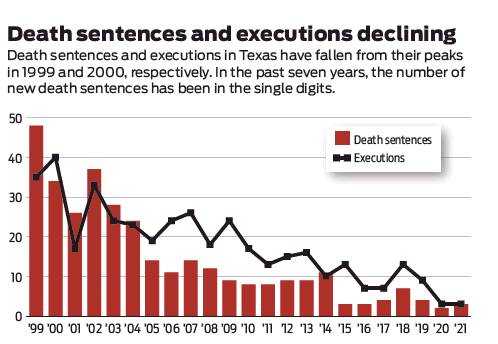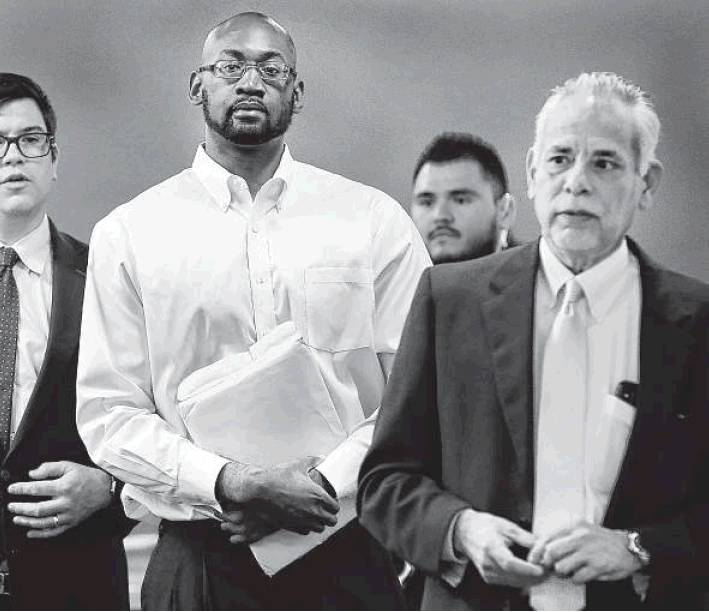Capital punishment at historic lows
Bexar man among 3 in Texas this year sent to death row
By Emilie Eaton STAFF WRITER
Bexar County is one of three Texas counties where juries sentenced people to death this year, placing it third behind Harris and Dallas counties in the number of death sentences imposed since 1974.
Still, the use of capital punishment locally and throughout the state remains at historically low levels, according to a new report by the Texas Coalition to Abolish the Death Penalty, a statewide advocacy group.
“As Texas moves away from the death penalty, what remains is an arbitrary, unfair and biased punishment that puts innocent lives at risk, disproportionately impacts Black defendants and those with intellectual disability, and refuses to recognize the humanity of those condemned by society,” Kristin Houlé Cuellar, executive director of the Texas Coalition to Abolish the Death Penalty, said in a news release.
“Texas’ death penalty is a mess, and it’s a mess of its own making,” Cuellar said.
The report comes about a year and a half after the COVID-19 pandemic largely halted executions and in-person jury trials, which could have yielded new death sentences, because of public health concerns.
Texas, which typically carries out the highest number of executions nationwide, executed three people in 2020, the lowest number in nearly 25 years. None of the people executed was from Bexar County.
The report found that the use of capital punishment remained at historic lows this year, but for different reasons — ongoing challenges, first considered by the U.S. Supreme Court, regarding the free exercise of religion in execution chambers or the assessment of intellectual disability in defendants.
Those challenges resulted in stays or withdrawals for nine death row inmates, or more than three-fourths of inmates scheduled for execution, the report found.
In the first case, earlier this year, the Supreme Court granted a stay of execution for John Henry Ramirez, who was convicted for a 2004 murder in Corpus Christi, and agreed to review his claim that the state’s denial to allow his pastor to “lay hands” on him or pray audibly during the execution violated his First Amendment rights.
The court heard oral arguments in the case in November and has yet to issue its final decision.
The second case involves Supreme Court decisions in 2017 and 2019 in Moore vs. Texas, which found that Texas courts were using outdated, nonmedical criteria to assess intellectual disability in defendants.
Those challenges resulted in similar claims for other inmates that are still being considered by lower courts, the report found.
Cuellar said the challenges should prompt Texas officials to rethink use of the death penalty.
“Given this continued dysfunction, the current pause in executions as the U.S. Supreme Court considers the exercise of religion in the execution chamber should compel Texans to conclude it is time for the state to abandon the death penalty altogether,” Cuellar said.
Declining support
The number of death sentences and executions in Texas and across the U.S. has steadily decreased over the last two decades. Texas executions peaked in 2000, when 40 people were put to death, the report states. In 2019, nine inmates were executed.
The decrease comes as public support for the death penalty has waned, especially as alternative sentences, such as life in prison without the possibility of parole, have become available.
Prior to 2005, when then-Gov. Rick Perry signed a law allowing juries to sentence defendants to life without parole, the alternative was life in prison with the chance of parole after 40 years.
Opponents of capital punishment argue that the death sentence is unfairly applied based on race and poses the risk of killing people with credible claims of innocence. According to the report, two-thirds of death sentences over the last five years have been imposed on people of color.
Of those, 40 percent were Black defendants, the report found. In comparison, nearly 13 percent of Texas’ population is Black, according to 2020 figures from the Census Bureau.
A Black man in Bexar County was among the three people who were sentenced to death in Texas this year.
On Aug. 6, after deliberating for nearly eight hours, a Bexar County jury sentenced Otis McKane to death for killing San Antonio Police Detective Benjamin Marconi in 2016.
According to the report, it was the first new death sentence imposed by a jury in Texas since March 2020 and the first in Bexar County in more than five years.
Advocates against the death penalty say another reason use of the death penalty continues to wane is that several district attorneys — including those in Dallas, Harris and Nueces counties — have vowed to curtail use of it.
Bexar County District Attorney Joe Gonzales, who took office in 2019, has said he will seek the death penalty in only the “worst of the worst cases.”
So far, he has chosen to seek the death penalty twice: for Brian Flores, accused in the 2015 deaths of two teenagers, and McKane. Flores’ case was later resolved after he pleaded guilty to murder and was sentenced to life in prison without the possibility of parole.
In another case this year, Gonzales’ office chose not to pursue the death penalty after the Texas Court of Criminal Appeals ruled that the defendant should get a new punishment hearing.
Noah Espada had been sentenced to death in 2005 for suffocating a woman he encountered while on his way to kill the manager of a downtown dance club.
In 2015, the Court of Criminal Appeals ruled that Espada should get a new punishment hearing because a witness lied during the initial punishment phase.
Earlier this year, prosecutors agreed not to seek the death penalty as part of a plea deal. Espada, now 37, pleaded guilty to two murder charges and received two sentences — 20 years in prison and life in prison — that will be served consecutively.
With credit for time served, Espada will be eligible for parole as a 71-year-old, in 2055. eeaton@express-news.net

